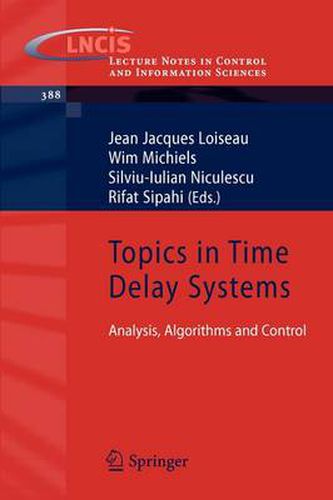Readings Newsletter
Become a Readings Member to make your shopping experience even easier.
Sign in or sign up for free!
You’re not far away from qualifying for FREE standard shipping within Australia
You’ve qualified for FREE standard shipping within Australia
The cart is loading…






This title is printed to order. This book may have been self-published. If so, we cannot guarantee the quality of the content. In the main most books will have gone through the editing process however some may not. We therefore suggest that you be aware of this before ordering this book. If in doubt check either the author or publisher’s details as we are unable to accept any returns unless they are faulty. Please contact us if you have any questions.
Time delays are present in many physical processes due to the period of time it takes for the events to occur. Delays are particularly more pronounced in networks of interconnected systems, such as supply chains and systems controlled over c- munication networks. In these control problems, taking the delays into account is particularly important for performance evaluation and control system’s design. It has been shown, indeed, that delays in a controlled system (for instance, a c- munication delay for data acquisition) may have an ambiguous nature: they may stabilize the system, or, in the contrary,they may lead to deteriorationof the clos- loop performance or even instability, depending on the delay value and the system parameters. It is a fact that delays have stabilizing effects, but this is clearly con i- ing for human intuition. Therefore,speci c analysis techniquesand design methods are to be developed to satisfactorily take into account the presence of delays at the design stage of the control system. The research on time delay systems stretches back to 1960s and it has been very active during the last twenty years. During this period, the results have been presented at the main control conferences(CDC, ACC, IFAC), in specialized wo- shops (IFAC TDS series), and published in the leading journals of control engine- ing, systems and control theory, applied and numerical mathematics.
$9.00 standard shipping within Australia
FREE standard shipping within Australia for orders over $100.00
Express & International shipping calculated at checkout
This title is printed to order. This book may have been self-published. If so, we cannot guarantee the quality of the content. In the main most books will have gone through the editing process however some may not. We therefore suggest that you be aware of this before ordering this book. If in doubt check either the author or publisher’s details as we are unable to accept any returns unless they are faulty. Please contact us if you have any questions.
Time delays are present in many physical processes due to the period of time it takes for the events to occur. Delays are particularly more pronounced in networks of interconnected systems, such as supply chains and systems controlled over c- munication networks. In these control problems, taking the delays into account is particularly important for performance evaluation and control system’s design. It has been shown, indeed, that delays in a controlled system (for instance, a c- munication delay for data acquisition) may have an ambiguous nature: they may stabilize the system, or, in the contrary,they may lead to deteriorationof the clos- loop performance or even instability, depending on the delay value and the system parameters. It is a fact that delays have stabilizing effects, but this is clearly con i- ing for human intuition. Therefore,speci c analysis techniquesand design methods are to be developed to satisfactorily take into account the presence of delays at the design stage of the control system. The research on time delay systems stretches back to 1960s and it has been very active during the last twenty years. During this period, the results have been presented at the main control conferences(CDC, ACC, IFAC), in specialized wo- shops (IFAC TDS series), and published in the leading journals of control engine- ing, systems and control theory, applied and numerical mathematics.